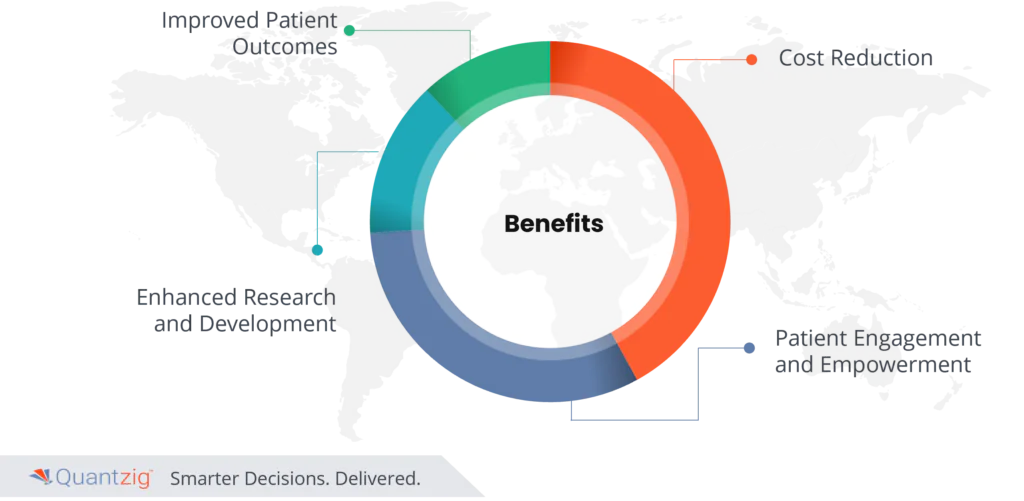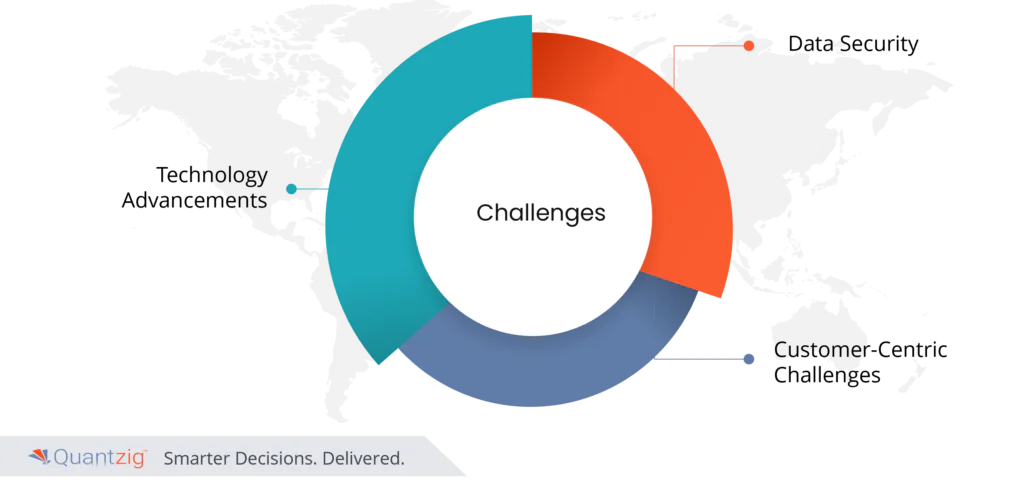In the ever-evolving landscape of the healthcare industry, the integration of big data analytics has emerged as a transformative force. The vast amounts of data generated within the healthcare ecosystem hold immense potential for insights that can enhance patient outcomes, optimize operations, and drive innovation. This case study explores the multifaceted use cases, benefits, impacts, and challenges of big data analytics in healthcare, elucidating the importance of this technology in shaping the future of healthcare delivery.
Table of Contents
Healthcare Industry Overview
The healthcare industry has seen a complete overhaul in the recent years due to big data analytics. Given the ubiquity of healthcare data generated by business processes within the healthcare sector, healthcare data analytics and big data analytics for smart healthcare play an increasingly important role in every aspect of healthcare decision making. In such an environment, the use of solutions such as big data analytics for smart healthcare is not only crucial to analyze data generated by smart health devices but also an essential source of patient and operational information that drives decision making in the healthcare services sector.
Factors like increasing health costs and the outbreak of chronic diseases have necessitated the use of health insurance among people. This has subsequently resulted in the continuous growth and development of companies in the health insurance marketplace. However, the processing of health insurance claims involves a huge amount of data. This acts as a major obstacle in maintaining an efficient utilization management process.
While the era of consumerism in healthcare has finally arrived. The availability of healthcare newsletters from healthcare industry players, direct-to-consumer advertising of pharmaceuticals, and most importantly, the ubiquity of the Internet has made it easier for consumers to obtain information about their medical conditions and possible treatments at their fingertips. As customer satisfaction becomes an increasingly important metric, consumerism presents healthcare industry players with both challenges and opportunities.
A detailed healthcare industry analysis reveals that this sector is different from other customer-facing sectors and there isn’t a clean one-to-one transition between what works for other consumer-facing industries and what works in the healthcare industry. The growing focus toward consumerism has been manifested through payment options such as- the growing importance of big data, technological adaptations, and tax-advantaged healthcare accounts. This has resulted in a more competitive marketplace and this competition is expected to bring about major improvements in business practices and, potentially, health outcomes.
Use Cases of Big Data Analytics in Healthcare:
- Predictive Analytics for Disease Prevention: Big data analytics enables the identification of patterns and trends in patient data, facilitating predictive models for disease outbreaks and epidemics. This proactive approach supports public health interventions and preventive measures.
- Clinical Decision Support Systems: Healthcare data analytics companies can leverage big data analytics to access comprehensive patient records, treatment histories, and relevant medical literature. This wealth of information aids in making well-informed, data-driven decisions about patient care.
- Personalized Medicine and Treatment Plans: Analyzing large datasets allows for a deeper understanding of individual patient characteristics, genetic makeup, and treatment responses. This, in turn, enables the development of personalized medicine tailored to a patient’s unique profile.
- Efficient Operational Management: Healthcare institutions utilize big data analytics to optimize their operational efficiency. From managing patient flow to resource allocation, analytics plays a pivotal role in streamlining processes and minimizing bottlenecks.
- Fraud Detection and Prevention: Big data analytics can be employed to detect anomalies and patterns indicative of fraudulent activities, protecting healthcare organizations from financial losses and ensuring the integrity of insurance claims.
Benefits of Big Data Analytics in Healthcare:

- Improved Patient Outcomes: By providing actionable insights into patient data, big data analytics contributes to enhanced diagnostics, treatment plans, and overall care, resulting in improved patient outcomes.
- Cost Reduction: Optimizing operational workflows and resource allocation through analytics leads to cost reductions for healthcare providers, allowing them to allocate resources more efficiently.
- Enhanced Research and Development: Big data analytics accelerates medical research by providing researchers with access to vast datasets for clinical trials, genomic studies, and drug development, expediting the discovery of new treatments.
- Patient Engagement and Empowerment: Analytics facilitates the development of patient-centric approaches, empowering individuals to actively participate in their healthcare decisions and treatment plans.
Impact and Importance of Big Data Analytics in Healthcare:
- Data-Driven Insights: Big data analytics transforms raw healthcare data into meaningful insights, empowering healthcare professionals to make informed decisions based on evidence and trends.
- Population Health Management: Analyzing large datasets helps healthcare organizations manage the health of populations more effectively, identifying at-risk groups and implementing preventive measures.
- Real-time Monitoring: The ability to monitor patient vitals and health parameters in real-time enables timely interventions, reducing the risk of complications and improving overall patient care.
- Innovation and Continuous Improvement: Healthcare providers can harness big data analytics to drive innovation, implement continuous improvement strategies, and stay abreast of evolving medical practices.
Challenges of Big Data Analytics in Healthcare:
- Data Security and Privacy Concerns: Healthcare data is sensitive and subject to strict privacy regulations. Ensuring the security and privacy of patient information poses a significant challenge.
- Interoperability Issues: The integration of disparate data sources, often using different systems and formats, poses challenges to achieving seamless interoperability, hindering the effectiveness of analytics.
- Resource Constraints: Implementing and maintaining robust big data analytics infrastructure requires significant resources, both in terms of technology and skilled personnel, which may be a barrier for some healthcare organizations.
- Ethical Considerations: As analytics delve into personal health information, ethical considerations surrounding consent, data usage, and potential biases in algorithms become critical concerns.
About the Healthcare Client
Headquartered in California, the client is a Fortune 500 healthcare organization. The healthcare industry player employs nearly 9,000+ employees globally and is well-known for venturing into digital healthcare domain.
Challenges Faced by the Healthcare Client:
Like every other organization in the industry, our client was also facing a myriad of challenges.

- Technology Advancements: Health insurance companies are plagued by factors like lack of innovative capabilities and operational expansion. Such issues have stunted the market growth of health insurance companies. In the dynamic health insurance marketplace, technical advancements coupled with increasing consumer buying power is considered crucial since it drives the analytics behavior of the health insurance data.
- Data Security: In the digitized age, a lot of people are concerned about security breaches when it comes to sharing their personal data with the healthcare provider. The data is critical for the health insurance companies to calculate and determine insurance policies for the buyers. Hence, it is important for health insurance companies to strengthen their security measures and assure the same to the customers in order to drive their insurance policy sale.
- Customer-Centric Challenges: The healthcare industry player was facing several other customer-centric challenges that prevented them from retaining their market position in the healthcare space. With healthcare increasingly becoming consumer-focused the healthcare industry player faced challenges in leveraging their big data to personalize care and services rendered. The client believed that improving patient experience was all about embracing consumerism to transform themselves into a consumer-centric healthcare brand.
Solutions Delivered with Big Data Analytics
The client was able to leverage big data analytics to realize a plethora of benefits. In order to help our readers effectively gauge our impact, we’ll be highlighting the benefits in a use-case format:
Utilization Management Process: The client was able to improve their utilization management (UM) process through Quantzig’s big data analytics solution to curtail wastage of resources. This process is significant in governing the pre-approval of health insurance coverage for many medical procedures. The big data analytics solution helped identify lucrative areas of investment in the health insurance marketplace. Additionally, the solution offered provided the necessary information to effectively assess the amount of premium they need to quote to a prospective health insurance buyer.
Effectively Overcome Challenges: Quantzig’s big data analytics solution aided the healthcare industry player to sort through their internal as well as external data points to validate several assumptions and discover new ones that they were unaware of. Big data analytics along with the consultative support from our experts offered a unique solution to overcome their big data challenges. Embracing big data analytics as a lifeline not only guided the healthcare industry player to a more stable ground but also enhanced data transparency to build new financial structures and patient care models.
Examine Data Sets in Healthcare: With the help of big data analytics, the medical imaging firm was able to examine varied data sets in patient healthcare. Moreover, the medical imaging client was able to tap potential market trends and customer preferences and make further informed business decisions. The engagement also assisted the client in analyzing the potentialities of the market in terms of the opportunities, customer service, and further improved operational efficiency. The engagement also helped the client identify more effective ways of promoting businesses and curtail additional costs associated with storing data.
Request for more information to know how you can leverage big data analytics to empower your organization with deeper insights to enhance data-driven decisions.
Early Diagnosis + Clinical Risk Score: The aim of big data analytics for smart healthcare is to focus on improvements that can help healthcare data analytics companies to identify and analyze key signs and compare them with the observations recorded during initial assessments to compute a risk score that indicates a patient’s attrition rate based on the risk of decline. We helped our client employ a clinical risk score as an indicator of patient decline based on the data generated by smart health devices to help optimize care and enhance device efficiency.
Evidence-Based Protocols: The application of big data analytics for smart healthcare service improvements offers several other benefits that help healthcare service providers to gain detailed insights into the factors impacting patient health. We helped our client gain insight into the completeness and timeliness of vitals, modifiers, and other documentation recorded, and identify outliers and opportunities by leveraging healthcare data sets.
Reduction of False Alarms: Adopting big data analytics for smart healthcare improvements helps healthcare service providers to track and monitor patient health based on location data and demographics. It also offered comprehensive insights on device utilization rates and location in case of maintenance and troubleshooting requirements. With healthcare analytics, we helped our clients gauge and analyze thresholds for alarms on a single dashboard that uses data to manually adjust and predict how changes in threshold values will impact the number of alarms received.
Big data analytics has ushered in a new era in healthcare, promising improved patient care, operational efficiency, and transformative innovations. The use cases, benefits, impacts, and challenges outlined demonstrate the critical role big data analytics plays in shaping the healthcare landscape. As technology continues to evolve, the integration of big data analytics will be pivotal in driving positive outcomes for both healthcare providers and the individuals they serve.
Big Data Analytics Solution Insights
Quantzig’s big data analytics solution analyzes diverse and complex data to constantly improve and increase the scope of patient care. This includes an analysis of all the necessary processes in healthcare insurance management. This solution helped the health insurance company to leverage actionable insights and gain a futuristic vision, which, in turn, helped them in organizing their processes and establish their presence in the health insurance marketplace.
With years of expertise in offering a plethora of services, Quantzig’s big data analytics solution helps healthcare data analytics companies in the medical imaging space manipulate and manage large data sets and improve healthcare outcomes while reducing costs.
Speak with our analytics experts to know how big data analytics can help healthcare data analytics companies gain comprehensive insights to deliver intelligent, timely actions that improve customer engagement, increase revenue, and lower costs.


